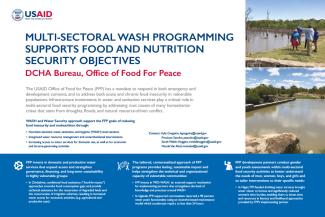Food For Peace
Infrastructure investments in water and sanitation services play a critical role in multi-sectoral food security programming by addressing root causes of many humanitarian crises that stem from droughts, floods, and natural resource-driven conflict.
The USAID Office of Food for Peace (FFP) has a mandate to respond in both emergency and development contexts, and to address both acute and chronic food insecurity in vulnerable populations. WASH and Water Security approach support the FFP goals of reducing food insecurity and malnutrition through:
- Nutrition-sensitive water, sanitation, and hygiene (WASH) interventions
- Integrated water resource management and watershed-level interventions
- Increasing access to water services for domestic use, as well as for economic and income-generating activities
Contact: Kyla Gregoire, Precious Sancho, Sarah Welsh-Huggins, Nicole Van Abel
FFP invests in domestic and productive water services that expand access and strengthen governance, financing, and long-term sustainability in highly vulnerable groups:
- In Zimbabwe, conditional food assistance (“food-for-assets”) approaches smoothe food consumption gaps and provide technical assistance for the restoration of degraded lands and the construction of irrigation schemes, resulting in increased water access for economic activities (e.g., agricultural and productive uses)
The tailored, contextualized approach of FFP programs provides lasting, sustainable impact and helps strengthen the technical and organizational capacity of vulnerable communities:
- FFP invests in ‘PRO-WASH,’ an external support mechanism for implementing partners that strengthens the level of knowledge and practices around WASH
- In Uganda, FFP-supported communities reported a 98 percent water point functionality using an incentive-based maintenance model which accelerates repairs to less than 24 hours
FFP development partners conduct gender and youth assessments within multi-sectoral food security activities to better understand the needs of men, women, boys, and girls and to tailor interventions to their specific needs:
- In Niger, FFP-funded drinking water services brought water closer to homes and significantly reduced women’s time burden, enabling them to invest time and resources in literacy and livelihood approaches provided by FFP’s implementing partner

